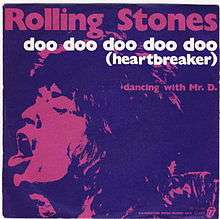Doo Doo Doo Doo Doo (Heartbreaker)
| "Doo Doo Doo Doo Doo (Heartbreaker)" | ||||||||||||
|---|---|---|---|---|---|---|---|---|---|---|---|---|
 | ||||||||||||
| Single by The Rolling Stones | ||||||||||||
| from the album Goats Head Soup | ||||||||||||
| B-side | "Dancing with Mr. D" | |||||||||||
| Released | December 1973 | |||||||||||
| Format | 7" | |||||||||||
| Recorded | November–December 1972, May–June 1973 | |||||||||||
| Genre | Rock, funk rock, hard rock | |||||||||||
| Length | 3:27 | |||||||||||
| Label | Rolling Stones | |||||||||||
| Writer(s) | Jagger/Richards | |||||||||||
| Producer(s) | Jimmy Miller | |||||||||||
| The Rolling Stones singles chronology | ||||||||||||
| ||||||||||||
| ||||||||||||
"Doo Doo Doo Doo Doo (Heartbreaker)" is the fourth track on The Rolling Stones' 1973 album Goats Head Soup.
Written by Mick Jagger and Keith Richards, "Doo Doo Doo Doo Doo (Heartbreaker)"'s lyrics relate two stories: one is a story of New York City police shooting a boy "right through the heart" because they mistook him for someone else, and the second of a ten-year-old girl who dies in an alley of a drug overdose. Neither of these events are known to be factual. However, it is certainly possible that Jagger incorporated into the lyrics some elements of a notorious police shooting that took place around the time the song was released.
In April of 1973 a ten-year-old boy named Clifford Glover was with his father when plainclothes police stopped them at gunpoint in Queens, in New York City, supposedly having mistaken the two for suspects in an armed robbery (the robbers were described as being about one foot taller than the boy). The boy and his father ran, fearing that they were about to be victims of a robbery. The police chased them and one officer shot the 10-year-old boy in the back, killing him. The bullet entered Glover's lower back and emerged at the top of his chest (i.e., went through his heart). The case resulted in riots and a murder indictment against the officer, who was later acquitted in a jury trial.[1]
After telling the story of the police shooting the wrong person, Jagger sings,
- You heartbreaker, with your .44, I want to tear your world apart.
The .44 magnum cartridge had been recently made famous by the 1971 film Dirty Harry, in which Harry Callahan uses "the most powerful handgun in the world" to cleanse the streets of crime. The lyrics complement the music, which Rolling Stone magazine described as "urban R&B", due to its funk influence and prominent clavinet part (played by Billy Preston).[2]
"Doo Doo Doo Doo Doo (Heartbreaker)" was first recorded in November and December 1972 before being re-recorded early the following summer. Jim Price arranged the song's horns and played sax, while Chuck Findley took over for Price on trumpet. Mick Taylor played the lead guitar part (which features use of a wah-wah pedal, and a Leslie speaker), Richards played bass; Preston plays clavinet (also using a wah-wah), and RMI Electra Piano.[3] Released as the second single from Goats Head Soup in the US only (after the #1 hit "Angie"), it reached #15 in the US on the Billboard Hot 100 and has remained a staple on AOR and classic rock radio stations.
The song appeared on the American version of the compilation album Rewind (1971-1984).
It was featured in the series finale of the CBS drama Cold Case, the season 3 finale of Blue Bloods,[4] and the 2013 David O. Russell film American Hustle.[5]
Charts
| Chart (1974) | Peak position |
|---|---|
| US Billboard Hot 100[6] | 15 |
References
- ↑ "A Police Shot to a Boy's Back in Queens, Echoing Since 1973". The New York Times. Retrieved 2016-10-08.
- ↑ Scoppa, Bud (1973-11-08). "The Rolling Stones: Goats Head Soup: Music Reviews". Rolling Stone. Retrieved 2010-03-09.
- ↑ McPherson, Ian. "Track Talk: Doo Doo Doo Doo Doo (Heartbreaker)". Timeisonourside.com. Retrieved 2008-03-17.
- ↑ The song is played at the end of the 'This Way Out' episode of the Blue Bloods series (season 3 , episode 23).
- ↑ Pockross, Adam (18 April 2013). "Sony Shows First Footage of Jennifer Lawrence in 'American Hustle' at Cinemacon". Yahoo! Movies. Retrieved 4 May 2013.
- ↑ "The Rolling Stones – Chart history" Billboard Hot 100 for The Rolling Stones. Retrieved 19 June 2016.